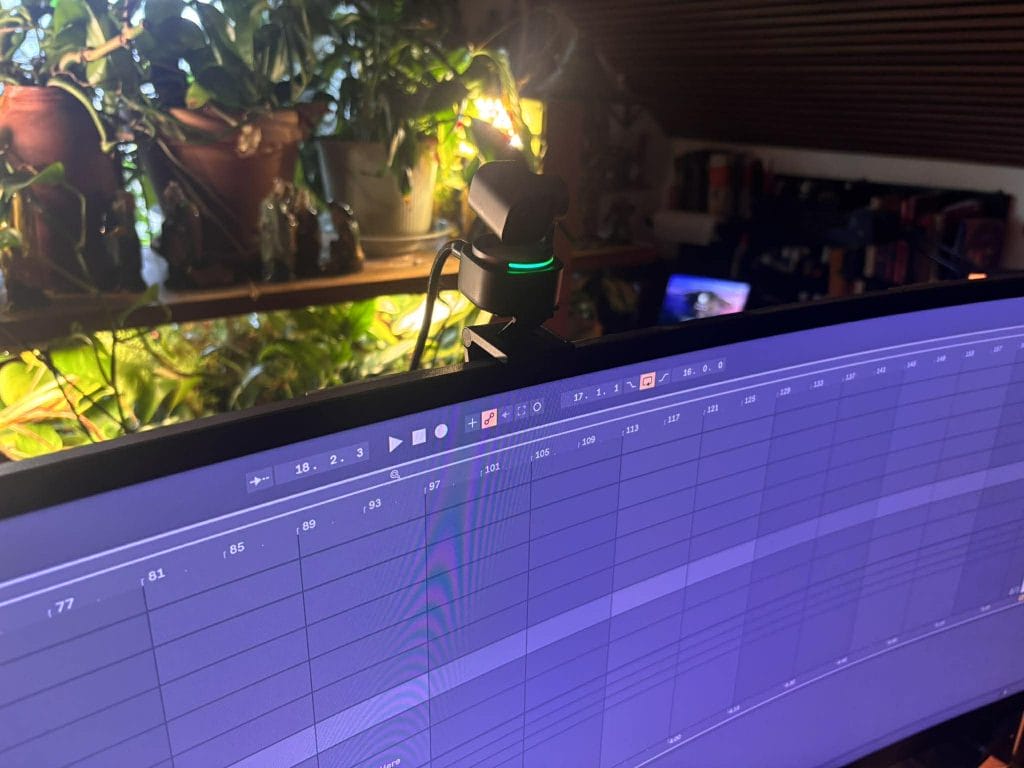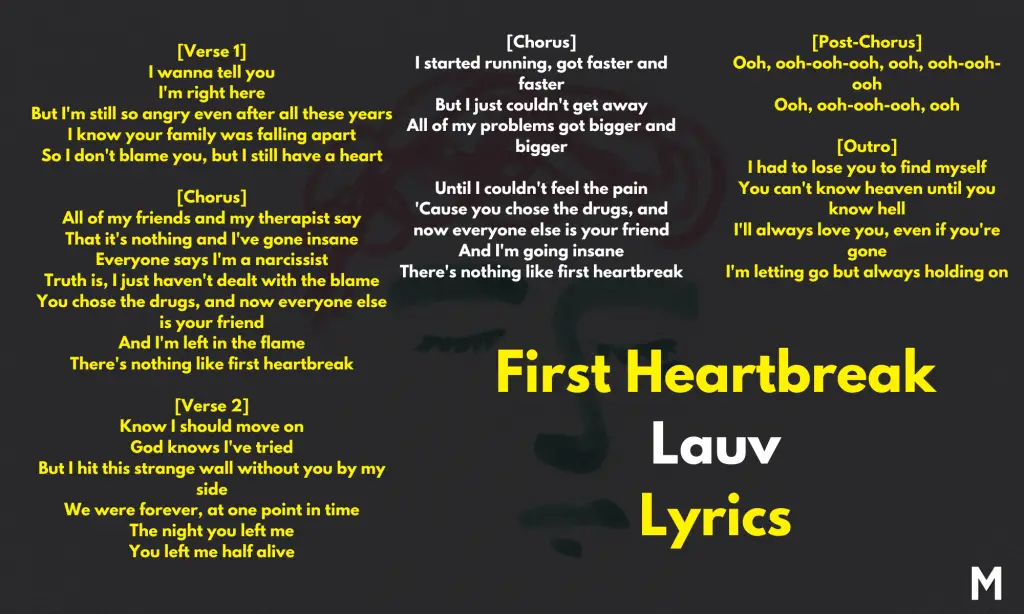Table of Contents
Images C/O AWAL Recordings
In Lauv’s latest single, “First Heartbreak,” the pop artist captures the nuanced emotions that come with the end of first love, balancing raw vulnerability with a sense of resilience. Lauv describes the record as one of his favorites and expresses the bittersweet pain of losing a deep connection while also suggesting that love can be rediscovered.
With an English degree and a background in literature and creative writing from the University of Oregon, I was particularly drawn to the poetic elements in the lyrics. Reflecting on Lauv’s lyrics, I found clear parallels with classic poetry that also explores the emotional landscape of love and loss. The themes in “First Heartbreak” echo the deep sorrow and lingering pain found in Lord Byron’s “When We Two Parted,” the necessary growth through separation in Emily Dickinson’s “I Cannot Live With You,” and the sense of betrayal in Edgar Allan Poe’s “The Raven.”
So, let’s see precisely what age-old poems can teach us about modern music and its lyrics.
Lauv First Heartbreak Lyrics
Lauv First Heartbreak Meaning
Lauv’s “First Heartbreak” captures the raw experience of losing a first love and reflects on the emotional toll that such a loss takes and the difficulty of moving on. We see a lot of unresolved anger, mixed with a sense of betrayal, especially when addiction becomes a factor in the relationship.
These themes are not new; they echo sentiments found in other works of literature, where poets have wrestled with similar emotions and experiences proving that these concepts are nothing new to the human experience and we as humans have always resonated with these stories and lived experiences.
That being said, drawing these connections between past literary and poetic works can hopefully help deepen modern artists’ expression of these timeless motifs and themes, which is why I’ll point out some of those connections as we break down the lyrics.

The Conflict Between Empathy and Anger
The first verse sets the stage for the emotional conflict Lauv’s speaker is dealing with:
“I wanna tell you / I’m right here / But I’m still so angry even after all these years.”
Here, the speaker is caught between wanting to reconnect and being unable to let go of the anger that’s lingered for years. This reminds me of Lord Byron’s poem “When We Two Parted,” where the speaker feels “half broken-hearted.” Byron’s phrase captures that sense of being torn apart by love’s end, similar to how Lauv’s speaker feels incomplete but still emotionally tied to their ex.
Lauv continues:
I know your family was falling apart / So I don’t blame you, but I still have a heart.
This line shows the speaker’s attempt to understand the ex-partner’s situation. But it also underscores that understanding doesn’t erase the hurt. The mention of still having a heart speaks to the ongoing emotional impact—something that’s not easily brushed aside. This tension between empathy and personal pain is a central theme here, much like in Byron’s work, where understanding the situation doesn’t diminish the heartbreak.
Blame, Perception, and Isolation
The chorus brings in the opinions of others, which complicates the speaker’s feelings:
“All of my friends and my therapist say / That it’s nothing and I’ve gone insane / Everyone says I’m a narcissist / Truth is, I just haven’t dealt with the blame.”
This part highlights the speaker’s isolation. They feel misunderstood by those around them, who seem to downplay their pain or even misinterpret it as narcissism. However, the admission that they haven’t dealt with the blame adds a layer of self-awareness. It suggests that beneath the anger and confusion, there’s a recognition of unresolved guilt or responsibility.
The repetition of “you chose the drugs, and now everyone else is your friend / And I’m left in the flame” hits hard. It shows how the partner’s choices have left the speaker feeling abandoned and engulfed by emotional pain. This ties into the theme of betrayal—something we also see in Edgar Allan Poe’s “The Raven,” though this work is markedly far more gothic in tone and nature than Lauv’s lighthearted pop-song. In that poem, the speaker is haunted by loss, with the raven serving as a constant reminder of the pain. Similarly, Lauv’s speaker can’t escape the feeling of being left behind, as if still burning in the aftermath of the breakup.
The line “There’s nothing like first heartbreak” sums up the uniqueness of this kind of pain. It’s a sentiment that many can relate to—first heartbreak is often the most intense, and its effects can be long-lasting, just as the poem “When We Two Parted” describes the lingering sorrow of a lost relationship.
The Struggle to Move On
In the second verse, we see the speaker’s attempt to move forward:
“Know I should move on / God knows I’ve tried / But I hit this strange wall without you by my side.”
This part is straightforward—the speaker knows what they should do but feels stuck. The “strange wall” represents the emotional and psychological barriers that prevent them from fully moving on.
Lauv continues:
“We were forever, at one point in time / The night you left me / You left me half alive.”
These lines reflect the disillusionment that comes when something once believed to be permanent falls apart. The idea of being left “half alive” is powerful—it suggests that the breakup has fundamentally changed the speaker, leaving them feeling incomplete. This ties back to the earlier theme of being “half broken-hearted” in Byron’s poem. Both lines express the devastating impact of love lost, leaving the speaker struggling to find a sense of wholeness again.
Escaping Pain and the Growth of Problems
The chorus returns with some variations, adding new layers to the themes we’ve already discussed:
“I started running, got faster and faster / But I just couldn’t get away / All of my problems got bigger and bigger / Until I couldn’t feel the pain.”
This reminds me of Emily Dickinson’s “I Cannot Live With You,” where the speaker realizes that separation is necessary for survival, even if it’s painful. Both works acknowledge that sometimes, letting go is the only way forward, but that doesn’t make it any easier.
The post-chorus, with its repetitive “Ooh, ooh-ooh-ooh” sounds, feels like an emotional release. It’s as if the speaker is letting out the feelings that words alone can’t fully express. Then, in the outro, we get a sense of resolution:
“I had to lose you to find myself / You can’t know heaven until you know hell / I’ll always love you, even if you’re gone / I’m letting go but always holding on.”
These lines suggest that the speaker has reached a point of acceptance. The loss was necessary for personal growth, even though it was painful. The idea that “You can’t know heaven until you know hell” echoes the sentiment in Dickinson’s poem, where the speaker recognizes that separation, though difficult, is part of the process of self-discovery. There’s also a bittersweet acknowledgment of enduring love, even as the speaker tries to let go—another common theme in poems about loss and growth.
Last-Minute Motifs And Correlations
Before we wrap things up, let’s dig a little deeper into some of the subtler connections between Lauv’s “First Heartbreak” and the poetic lines that have been echoing these themes for centuries.
Take Byron’s line from “When We Two Parted”: “They name thee before me, / A knell to mine ear; / A shudder comes o’er me—” That imagery of a name being a “knell” or a death toll resonates with Lauv’s sense of lingering pain when he sings about how his ex chose drugs and left him “in the flame.” Both lines capture that gut punch of hearing or thinking about someone who’s still deeply embedded in your memory, and it’s as if every mention or thought of them reignites the hurt.
Moving on to Dickinson, she’s known for her introspective exploration of the self, and that’s where another connection surfaces. In her poem, “After great pain, a formal feeling comes—,” she writes, “This is the Hour of Lead— / Remembered, if outlived, / As Freezing persons, recollect the Snow— / First—Chill—then Stupor—then the letting go—.” This line strikes at the core of the emotional numbness that follows heartbreak, something Lauv touches on when he mentions running faster and faster but still being unable to escape his pain.
The progression from chill to stupor to letting go in Dickinson’s poem mirrors Lauv’s own journey through the stages of heartbreak, from the initial shock to the eventual release.
Poe’s “The Raven” offers another layer of understanding, especially when the speaker describes the raven as “Quoth the Raven ‘Nevermore.’”
This refrain of finality, that unchangeable “nevermore,” echoes through Lauv’s realization that the relationship is over for good, even if he’s still grappling with the emotional fallout. Much like the persistent memories Lauv can’t shake, the raven’s constant reminder underscores the permanence of some losses—there’s no going back, no undoing what’s been done.
These lines and their connections to Lauv’s lyrics deepen the understanding of “First Heartbreak” by showing just how intertwined his themes are with the broader human experience. The same emotions that Byron, Dickinson, and Poe captured in their poetry are still relevant today, and Lauv’s song taps into that timeless well of heartbreak, betrayal, and the slow, often painful process of moving on. This intertextuality gives the song its weight, making it resonate on a level that goes beyond just the music, touching on something much more universal and enduring. What’s powerful about “First Heartbreak” is how it taps into these timeless themes, making them feel fresh and relevant all over again.
Lauv’s lyrics don’t just tell a story; they connect with the deeper truths about what it means to be human—how love can lift us up but also tear us apart, how growth often comes from the most painful experiences, and how some scars never fully fade. By drawing from these literary parallels, Lauv creates a song that’s not just personal but universal, resonating with anyone who’s ever had to piece themselves back together after everything they thought they knew fell apart.
The post Lauv First Heartbreak Lyrics And Meaning: The Literary Parallels You Didn’t Expect appeared first on Magnetic Magazine.






